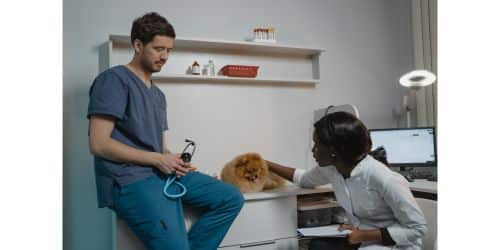As pet owners, we are aware of our pets’ behavior and health. When we notice our dog shaking when he breathes in, it can be concerning. This peculiar symptom may raise several questions. Is it something serious? Should I be worried? In this detailed post, we will look at the most common reasons why your dog may be shaking when he breathes in, allowing you to better understand and handle the problem.
Why is my Dog Shaking When he Breathes in?
There are several reasons why your dog may be shaking when he breathes in. Some potential causes include:
#1. Stress and Anxiety
It’s no secret that dogs, like humans, may experience anxiety and stress. These feelings might be triggered in our canine companions by loud noises, separation anxiety, or strange situations. When dogs are frightened or stressed, their bodies respond physically, including shaking. This trembling can affect their respiration, causing them to shake when they inhale.
#2. Anticipation and Excitement
Dogs are known for their limitless energy and upbeat personalities. Their body can shake involuntarily when they feel aroused or anticipate something exciting, such as playtime, walks, or eating. This excitement-induced shaking can also affect their breathing, resulting in the phenomenon of the dog shaking when he breathes in.
#3. Shivering and Temperature
Dogs have a higher body temperature than humans, and their bodies use a variety of heat-regulating processes. If your dog is exposed to frigid temperatures or feels cold, they may begin shivering to create heat. This shaking can spread to their respiratory muscles, causing the dog to shake when he breathes in.
#4. Discomfort and Pain
Pain or discomfort is one of the more serious causes of a dog shaking when he breathes in. Dogs may suffer from respiratory infections, muscle sprains, or even dental disorders, all of which can cause pain while breathing. This discomfort causes shaking as their bodies try to relieve the ache.
#5. Respiratory Infections
Canine respiratory illnesses, such as kennel cough or pneumonia, can cause coughing, wheezing, and trouble breathing. Due to the strain on their respiratory system, dogs with respiratory illnesses may shake when inhaling in some cases. If you feel your dog has a respiratory illness, get veterinary care right away.
#6. Tracheal Collapse
Tracheal collapse is a disorder in which the trachea, or windpipe, weakens and narrows. It is most common in small or toy breeds. When dogs with tracheal collapse inhale, they may cough, have difficulty breathing, and shake. A veterinarian can help you manage this illness by recommending lifestyle modifications and medications to alleviate symptoms.
#7. Heart-Related Problems
Heart conditions can also contribute to a dog shaking when he breathes in. Heart illnesses, such as congestive heart failure or arrhythmias, can impair the heart’s ability to adequately pump blood. As a result, dogs may have trouble breathing, coughing, or shaking while inhaling. A veterinarian’s timely diagnosis and treatment are critical for controlling heart-related disorders.
#8. Toxins or Poisoning
Certain chemicals or compounds, when consumed by dogs, can cause respiratory distress and trembling. Toxic substances such as home chemicals, drugs, or plants can affect the respiratory system of the dog, causing shaking when he breathes in. If you fear your dog has consumed something harmful, call your veterinarian or a pet poison helpline immediately.
#9. Neurological Disorders
Due to underlying neurological abnormalities, dogs may shake during breathing in rare circumstances. Seizures and tremors, for example, can cause trembling throughout the body, including the breathing muscles. If you notice any other neurological signs in addition to the shaking, you should speak with a veterinarian for an accurate diagnosis and treatment.
#10. Asthma and Allergies
Dogs can suffer from allergies and asthma, just like humans. Allergens such as pollen, dust mites, or specific foods can cause allergic reactions in dogs, resulting in coughing, wheezing, and difficulty breathing. Due to respiratory distress caused by allergies or asthma, dogs may shake when inhaling in some circumstances.
#11. Hypoglycemia
Hypoglycemia, or low blood sugar, can harm dogs, particularly small or toy types. When dogs’ blood sugar levels drop suddenly, they may exhibit a variety of symptoms such as shivering, weakness, disorientation, and fast breathing. If you feel your dog is suffering from hypoglycemia, give them a small amount of high-quality, readily digestible food and seek medical attention.
#12. Excessive Physical Activity
When dogs are engaged in severe physical activity or exercise, they may shudder when they breathe in. Dogs may experience muscle weariness, an elevated heart rate, and fast breathing during activity. This can cause tremors in their respiratory muscles, causing them to shake as they inhale. A correct warm-up, a moderate increase in intensity, and a proper cool-down can all help to reduce the shaking effect.
#13. Medication Side Effects
Certain medications for a dog may cause shaking or tremors as a side effect when he breathes in. These medications can affect the central nervous system, causing involuntary muscle movements such as shaking during breathing. If you feel that your dog’s shaking is caused by medication, speak with your veterinarian about possible alternatives or dosage modifications.
#14. Aging and Degenerative Conditions
Degenerative disorders, such as arthritis or degenerative myelopathy, can damage dogs’ movement and overall well-being as they age. These disorders can cause pain and discomfort, as well as difficulty breathing and tremors when inhaling. Regular veterinary check-ups and proper management measures can help enhance the quality of life for your elderly dog.
#15. Behavioral Motives
Dogs may shake as they breathe in due to behavioral factors in some cases. Dogs may shake or tremble in response to fear, anxiousness, or excitement. This behavior can be observed during visits to the veterinarian, encounters with unknown persons or animals, or stressful events. Understanding your dog’s behavior and creating a calm and supportive environment might help reduce shaking episodes.
#16. Other Underlying Medical Conditions
While we’ve discussed numerous frequent causes of a dog shaking when he breathes in, it’s important to note that other underlying medical conditions can also contribute to this symptom. Neurological diseases, physical weakness, hormone abnormalities, and even certain types of cancer are examples of these ailments. If your dog’s shaking continues or is accompanied by other troubling symptoms, a comprehensive examination by a veterinarian is required to identify and treat the underlying cause.
Is it serious?
The seriousness of a dog shaking when he breathes in depends on the underlying cause. It may not be a cause for urgent alarm in some cases, but it may signify a more significant health problem in others. It is critical to evaluate your dog’s overall health and any related symptoms.
If your dog shakes when breathing in but otherwise appears healthy and energetic, with no other concerning signs, it could be due to causes such as enthusiasm, anticipation, or moderate nervousness. These situations frequently settle on their own and do not necessitate emergency medical intervention. However, if the shaking persists or worsens, a veterinarian should be consulted to rule out any underlying health conditions.
Coughing, wheezing, difficulty breathing, fatigue, loss of appetite, or any indicators of pain or distress, on the other hand, could suggest a more serious disease. Shaking when breathing in can be caused by respiratory infections, cardiac difficulties, tracheal collapse, or brain abnormalities, and these illnesses may necessitate veterinarian care.
As a pet owner, you must trust your instincts and regularly watch your dog’s behavior and overall well-being. If you are unsure or concerned about the seriousness of the problem, it is always advisable to get professional guidance from a veterinarian. They will be able to assess your dog’s situation, perform any necessary tests or examinations, and provide an accurate diagnosis and treatment plan.
Remember that early detection and intervention can frequently result in better outcomes, so prioritize your dog’s health and well-being by getting veterinary advice when necessary.
What can I do to help my dog?
While the particular way to assist your dog will depend on the underlying cause of their shaking when breathing in, the following general principles may help you support your furry friend:
- Consult a Veterinarian: The first step is to make an appointment with a veterinarian. They will evaluate your dog, ask about their symptoms and behavior, and propose additional testing or diagnostic procedures to determine the underlying reason. An accurate diagnosis is critical to establishing the best course of action.
- Follow Treatment Suggestions: If your veterinarian determines that a specific issue or condition is causing your dog’s shaking, he or she will make treatment suggestions. It is critical to carefully follow these directions, which include administering medications, modifying their nutrition, getting enough rest, and making lifestyle modifications.
- Create a Quiet and Safe Environment: Making your dog’s environment quiet and safe will help decrease anxiety and tension, which can contribute to shaking. Make sure they have a nice and quiet place to relax that is free of excessive noise or interruptions. Consider employing calming tools like pheromone diffusers or soothing music developed exclusively for dogs.
- Manage Anxiety and Stress: If anxiety or stress is a factor, these underlying emotions must be addressed. Regular exercise, interactive play, and mental stimulation are all activities that can help alleviate your dog’s anxiety. Consider behavior modification approaches or seek the advice of a professional dog trainer or behaviorist.
- Follow Medication Instructions: If your dog requires medication to manage their health, you must follow the dosage and administration instructions. Give the drug exactly as directed by your veterinarian, and report any concerns or adverse effects as soon as possible.
Should I be worried if my dog is shaking?
Shivering and trembling could be signs of something more serious, such as poisoning, kidney failure, or injury. So, if your dog suddenly begins trembling or shivering, look for other symptoms such as diarrhea, vomiting, or limping. Then contact your veterinarian right away.
Is my dog shivering because he’s cold?
If your dog isn’t showing any other alarming signs and there aren’t any new stressors in their environment, they’re probably just shivering from the cold. Dogs shiver in chilly weather just like humans.
Why is my dog shaking but not sick?
Cold, excitement, stress, anxiety, seeking attention, pain or illness, and old age are some of the most prevalent causes of your dog shaking and shivering.
How do I know if my dog is in pain?
General behavior: Shaking, flattened ears, low posture, aggression, grumpy temperament, panting or crying, excessive licking or scratching a specific area, being reluctant to play, interact or exercise, lameness (limping), stiffness after rest, loss of appetite.
What is a shaking dog condition?
Shaker syndrome is a condition in which dogs experience generalized head and body shakes. Steroid-responsive tremors, generalized tremor syndrome, and idiopathic (cause unknown) tremor syndrome are all terms for this illness.
Can I give my dog paracetamol?
Unfortunately, several commonly used pain relievers, such as paracetamol and ibuprofen, are extremely harmful to animals. Administering human pain relievers in the improper dose, or even at all, can put your pet at risk of serious liver damage and red blood cell disorders.
Conclusion
It’s understandable to be concerned if your dog shakes when they breathe in, but it’s critical to approach the situation with patience and inquiry. You can acquire a better grasp of what is going on with your pet by investigating the numerous causes of this phenomenon, such as anxiety, excitement, temperature, pain, respiratory infections, tracheal collapse, heart troubles, toxins, and neurological illnesses. Always speak with a veterinarian to establish the underlying cause and get proper advice and treatment. You can help your dog breathe easier and restore their general well-being with their knowledge and your love and care.
Related Articles
- The Top 5 Reasons Why Dogs Sit on Their Owners
- What Does It Mean When a Dog Coughs Up Blood?
- The Best Plan B Options for Dogs
- The 10 Easiest Dogs to Take Care of
- Is Hydrogen Peroxide Safe for Dogs? Usage, Risks, and First Aid Tips
- Why Do Dogs Bark in Their Sleep?
- Why Is My Dog Shaking When He Breathes In?






